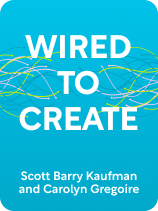

This article is an excerpt from the Shortform book guide to "Wired to Create" by Scott Barry Kaufman and Carolyn Gregoire. Shortform has the world's best summaries and analyses of books you should be reading.
Like this article? Sign up for a free trial here.
What are the creative benefits of daydreaming? Why should you think about past experiences?
Daydreaming is more than something that students do during class. According to Wired to Create, daydreaming is actually an important exercise in creativity.
Keep reading to learn how daydreaming can help you discover new insights.
Daydreaming and Creativity
What are the benefits of daydreaming? In their book, the third characteristic that Kaufman and Gregoire say creative people share is the habit of daydreaming. Daydreaming is when you explore your thoughts and let your mind wander as opposed to consciously directing your attention to one particular thing. Daydreaming may take the form of fantasizing about certain scenarios, exploring memories, imagining the future, contemplating certain experiences or emotions, and so on.
The authors explain that daydreaming is critical for creativity because it gives our task-focused mind (the one used in flow) a break and allows us to process the experiences and information we’ve gathered. The enhanced understanding about our lives and ourselves that we gain during this processing state allows us to come up with unique ideas and insights that we share through creative expression.
(Shortform note: While the authors say daydreaming gives our brains a break, Gawdat asserts in That Little Voice In Your Head that, rather than resulting in creativity, letting your mind wander usually results in rumination and suffering. This is because when the task-focus network of our brain is turned off, our thoughts are naturally drawn toward negativity. And while focusing on negative experiences might help you grow from them, Gawdat argues that this isn’t usually the case—instead, we get stuck in an obsessive cycle of rumination and regret over things beyond our control. Since we have no power over them, they cause us to suffer rather than inspire us to take action.)
Further, say the authors, thinking about past experiences may help you uncover new meanings and insights about humanity or life. They explain that when we develop these insights, we often feel the need to share them with others. Creative expression, like art or writing for example, is how we do so. In other words, developing new insights ignites our creative drive.
(Shortform note: In The Artist’s Way, Cameron recommends writing morning pages every day to facilitate the process of mind-wandering as creative tinder. Morning pages is a directed mind-wandering exercise—every morning right after waking up, you write three full-length pages about everything and anything that enters your mind. This “mind dump” increases creativity in two ways. First, it releases any concerns you may start the day with so you have a better mood and fewer burdens that stifle creativity throughout the day. Second, you’ll often uncover hidden yet meaningful ideas and feelings in your pages that spark creative insights that may otherwise go unnoticed.)

———End of Preview———
Like what you just read? Read the rest of the world's best book summary and analysis of Scott Barry Kaufman and Carolyn Gregoire's "Wired to Create" at Shortform.
Here's what you'll find in our full Wired to Create summary:
- What creativity truly means—and why it’s hard to define
- The 10 characteristics of creative people
- How to maximize your creative potential






